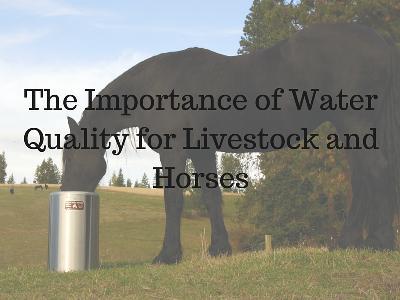The Importance of Water Quality for Livestock and Horses

Water is critical for life.
The average human body is made up of more than 60 percent water. We drink to replenish our fluid balance and maintain homeostasis. We drink to prevent dehydration. We drink to regulate our temperature and stay healthy.
Horses and livestock are no different, except they count on us for their care. Up to three quarter’s of a horses body is comprised of water; water accounts for up to 80 percent of cattle weight.
As a farmer and rancher, you know the importance of keeping your animals watered. Nelson’s Automatic Waterers make this task simple and straightforward.
With eight different models, our aluminum and stainless steel waterers are thermostatically controlled. And you’ll appreciate that they can be mounted three different ways: to a concrete pad or in a concrete pipe for the pasture or directly to your animal’s stall wall. You can also add an optional consumption indicator to track your animal’s water intake.
Animals can be finicky and it’s important you offer them plenty of fresh and clean drinking water. On average, a horse needs between 8-10 gallons of drinking water each day. And remember: You can lead a horse to water, but you can’t make him drink. Many horses, for example, won’t drink water if it’s filled with debris or particles. That’s where our automatic waterers come into play.
Our patented water valve provides a constant stream of fresh water, free of bacteria and algae. Our drinking bowls are made of stainless steel for easy removal, cleaning, and disinfection. And our optional heater will maintain the perfect drinking water temperature — most animals prefer temps ranging from 45-65°F — even during the coldest, most frigid winter months.
Are you ensuring the water quality for livestock and horses is optimal at your farm or stable? For more information on Nelson Automatic Horse and Livestock Waterers request a quote.
Related news
 Sheep with higher vitamin D levels give birth to heavier lambs
Sheep with higher vitamin D levels give birth to heavier lambs Researchers explore link between vitamin D levels and health and reproductive outcomes in sheep.
 Lawley’s to boost efficiency, footprint with new feed additive production site
Lawley’s to boost efficiency, footprint with new feed additive production site Lawley’s Inc. is seeking to improve its support of dairy producers, along with its production efficiency and quality control with a new Texas-based
 Big data could help improve livestock resilience
Big data could help improve livestock resilience Automation in livestock farming so far has been limited to dairy cows and pigs, but new developments expected for laying hens, broilers, meat cows and fish.
 New reproductive protocol for sheep uses natural hormones
New reproductive protocol for sheep uses natural hormones New system also decreases the time during which sheep are exposed to exogenous reproductive hormones.
 Mobile app updated to estimate horse bodyweight
Mobile app updated to estimate horse bodyweight University of Minnesota faculty launches updated, first-of-its-kind mobile app.